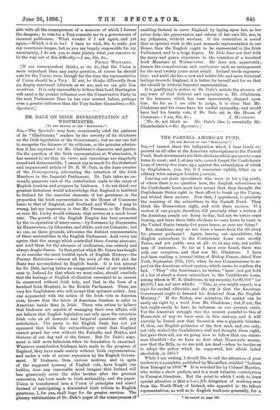THE PARNELL AMERICAN FUND.
[To THE EDITOR OF THE " SPECTATOR:1 cannot share the indignation which I hear freely ex- pressed on all sides at the American subscriptions to the Parnell Fund. Such investments are little chickens which are sure to come home to roost; and I, at any rate, cannot forget the Confederate Loan of twenty-five years ago, against the subscription of which by Englishmen, you, Sir, if I remember rightly, lifted up a solitary voice amongst London journals.
Leaving out mere speculators who went in for a big profit, of whom there is no question here, the English subscribers to the Confederate Loan must have meant that they thought the Confederate States right in their effort to break up the Union, and wished them success. Now that, I apprehend, is precisely the meaning of the subscribers to the Parnell Fund. They think the Home-rulers right, and wish them success. If a section of our people, therefore, did precisely what a section of the American people are doing to-day, had not we better cease fuming, and leave these little chickens to come home to roost in the United States twenty-five years hence, as ours are doing P But, meantime, may we not draw a lesson from the old story for present guidance ? Again, leaving out speculators, the English subscribers to the Confederate Loan were mostly Tories, and not public men at all ; or, at any rate, not public men of eminence. So far as I have ever heard, there was only one exception, and that was Mr. Gladstone. I have just been reading a journal letter of Bishop Fraser, dated New York, September 27th, 1865, when he was Commissioner to re- port on the American school system, which seems to confirm the fact. " They " (the Americans), he writes, "have just got hold of a list of about a dozen subscribers to the Confederate Loan, among whom is W. E. Gladstone, to my surprise, for $2,000" (or 22,000,1 am not sure which). "This, as you might expect, is a topic for excited editorials, and the cry is that the American Government ought to demand hie dismissal from the English Ministry." If the Bishop was mistaken, the matter can be easily set right by a word from Mr. Gladstone ; but if not, the fact ought surely to have its influence on our present crisis. For the American struggle was the nearest parallel to this of Home-rule of any we have seen in this century, and it will scarcely be denied now that Secession was a gigantic blunder. If, then, one English politician of the first rank, and one only, not only wished the Confederates well and thought them right, but gave them aid, are we going now to follow that one states- man blindfold—for we have no hint what Home-rule means, now that the Bills, as we are told, are dead—when he invites us to adopt the policy which he supported, but which failed absolutely, in 1866 P While I am writing, I should like to call the attention of your readers to a pamphlet, published by Macmillan, entitled "Letters from Donegal in 1886." It is vouched for by Colonel Maurice, who writes a short preface, and is a most valuable contribution to Unionist literature. But the point to which I wish to draw special attention is that a bond-fi,de delegation of working men from the North-West of Ireland, who appealed to the labour representatives, as well as to English workmen generally, for a
* Reviewed on page 849.


































 Previous page
Previous page